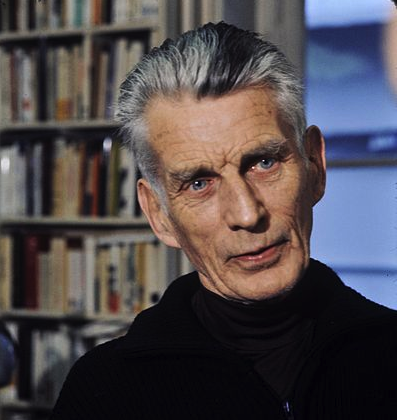Secure your place at the Digiday Media Buying Summit in Nashville, March 2-4

Tom Butler is Digiday’s copy editor and an English professor at Eastern Kentucky University.
Odd as it may seem, an embrace of failure is the advice of the day in Silicon Valley, according to Mark O’Connell in this essay in Slate. More specifically, and stranger yet, startup entrepreneurs have taken a liking to the steely-eyed playwright and novelist Samuel Beckett, whose fame centers on his Nobel Prize-winning writing and, perhaps to a lesser degree, his near-fatal street fight with Prudent, a Parisian pimp.
O’Connell says that this wave of enthusiasm for Beckett takes the form of a fondness for a quotation from a particularly opaque prose work called “Worstward Ho!” Richard Branson, for one, concludes an article, “What Will Virgin Look Like in 2050?” by quoting Beckett: “Ever tried. Ever failed. No matter. Try again. Fail again. Fail Better.” He then glosses the passage: “The quote is from the playwright, Samuel Beckett, but it could just as easily come from the mouth of yours truly. An entrepreneurial mindset has been at the heart of Virgin for 40 years.”
Beckett, however, is not the best author to draw on in support of “an entrepreneurial mindset.” Importantly, Beckett did not expect things to get better after each failure. As a corrective to Branson’s optimistic take on failing, we should look at the speech of a tramp named Vladimir at the end of Beckett’s play “Waiting for Godot.” He offers a grim vision of human life: “Astride of a grave and a difficult birth. Down in the hole, lingeringly, the grave digger puts on the forceps. We have time to grow old. The air is full of our cries.”
That is, to Vladimir human life is nicely encapsulated in this image: A woman in labor straddles a grave, and her obstetrician doubles as a grave digger and uses forceps to quickly pull the newborn into the grave. That’s not, I suspect, the kind of entrepreneurial spirit Sir Richard would like to champion.
Where, then, should an eager startup founder turn in the library to find inspiration for her uncertain adventure?
Beckett’s title “Worstward Ho!” comes from Beckett’s his fascination with Shakespeare’s “King Lear.” At one of the more calamitous moments of that play, the much-abused character Edgar says, “And worse I may be yet: the worst is not /So long as we can say ‘This is the worst.’”
If you can still say that this is as bad as things can get, things can get worse. You could, for example, lose your tongue and not be able to say anything at all. Just ask Lavinia in Shakespeare’s “Titus Andronicus,” whose tongue and hands are violently severed. This may be cold comfort, but elsewhere in “Lear” we can find moments of consolation relevant to the challenges of the digital media industry.
When the goodly servant Kent is unjustly placed in the stocks by Lear’s cruel daughter and son-in-law, he says, “Nothing almost sees miracles / But misery.” Fortunately, most in the industry are not confined to the stocks — evidenced by Digiday’s coverage of the open floor plans of many agencies. Yet many would acknowledge that success comes only through a long slog, and even then it is not guaranteed.
JC Penney, for example, hardly expected great success from its intentionally misspelled tweets during the Super Bowl. Indeed, for a while, when its Twitter audience suspected the author of the tweets was drunk, disaster seemed imminent. But good luck coupled with some good decisions — like moving up the announcement of the “tweeting with mittens” to assuage worried and confused followers — resulted in laughs and, more important, plenty of good exposure for the company.
In Beckett’s world, miracles and success are absent, but in advertising and at times in Shakespeare, they are what keep us going. And as another of Beckett’s characters tersely puts it, “That’s how it is on this bitch of an earth.”
Image via Wikimedia Commons
More in Marketing

Thrive Market’s Amina Pasha believes brands that focus on trust will win in an AI-first world
Amina Pasha, CMO at Thrive Market, believes building trust can help brands differentiate themselves.

Despite flight to fame, celeb talent isn’t as sure a bet as CMOs think
Brands are leaning more heavily on celebrity talent in advertising. Marketers see guaranteed wins in working with big names, but there are hidden risks.

With AI backlash building, marketers reconsider their approach
With AI hype giving way to skepticism, advertisers are reassessing how the technology fits into their workflows and brand positioning.





